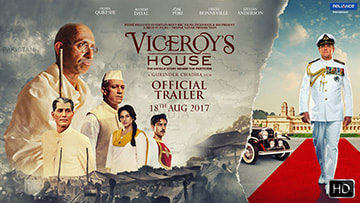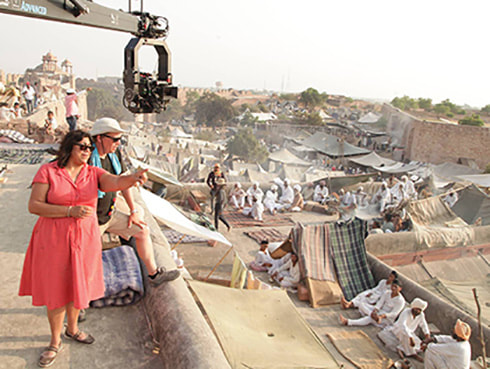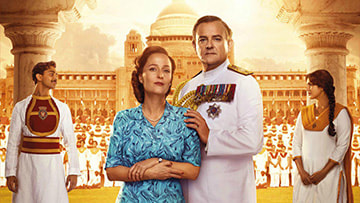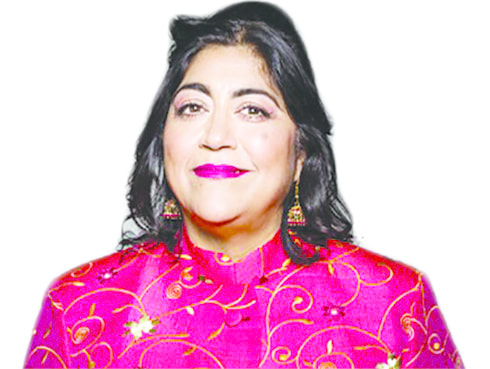
By DEVIKA C. MEHTA
The tragic 1947 partition of India will always be remembered with tears. Time and again, movies on the subject have contemplated the adversities and horrifying truths. Yet again acclaimed film director Gurinder Chadha has decided to explore the topic with keen vision. Chadha has dared to come out of her comfort zone and pin down a...
The tragic 1947 partition of India will always be remembered with tears. Time and again, movies on the subject have contemplated the adversities and horrifying truths. Yet again acclaimed film director Gurinder Chadha has decided to explore the topic with keen vision. Chadha has dared to come out of her comfort zone and pin down a...
complex story in ‘Viceroy’s House’. Interestingly, her movies usually rotate around light culture clash-comedies like `Bend It Like Beckham’ and `Bride and Prejudice.’ In fact most of her films explore the lives of Indians living in England. But, this time, the tables have turned with her taking on the lives of British rulers in India and their impact on common Indians.
Talking to IJ, Chadha throws light on her choice of subject and challenges faced.
Calling ‘Viceroy’s House’ an intensely personal subject as her family was dramatically impacted by the partition, she says. “I wanted to make this film to find out why my family had to leave their home and become refugees. My ancestors are from Punjab,in the region which is now part of Pakistan. I grew up in England and didn’t have an ancestral homeland to call my own. So the shadow of the partition has been with me my whole life. My family rarely talked about the partition because it was so raw and painful but my grandmother who lived with us was traumatized by what happened.”
But, who is actually responsible for the partition- politicians, plain circumstances, or fate? She mentions, “At school, the little I was taught claimed that the partition happened because Indians were fighting amongst ourselves and the British has no choice but to divide the country because of the communal violence between Hindus, Muslims and Sikhs. So it was somehow our fault. What I realized during the research is that the history I had been taught was totally a lie, complete lie. Partition was not about neighbors suddenly attacking each other after living together for centuries. It was a political act done deliberately for British strategic interests in India. My intention is to examine how someone like me can look at new historical evidence and explore an alternative historical narrative to what I’d been taught as a girl.”
Was the partition a political act? She confirms and shares her opinion by saying, “My film is based on top secret British documents that look at what Britain and America had to gain from the partition and the creation of Pakistan. As part of my research I read Narendra Singh Sarila’s ‘The Shadow Of The Great Game’, which exposes these top secret government files that had been sealed for 50 years. These documents show that the decision to divide India was influenced by the world map and who would retain power in the region.” The revelation comes with a realization that one must be free from selfness and divisiveness- two issues which are coherent even today. She agrees, “Yes, we are living in a world that is quite divisive. We have politicians talking about building walls and labeling huge groups of people. This film is incredibly topical today as it sends a warning that in this current time of the politics of division and hate, of Trump’s travel ban, and our international refugee crises, that when politicians try to divide and rule people along religious lines, there will be tragic consequences.”
The movie that has been shot in Jodhpur and Delhi has some very wonderful scenes like the one where the Viceroy’s House staff have to divide all the possessions, right down to the utensils, and determine whether they are to stay in India or go to Pakistan. The other is a heartbreaking scene where Huma Qureshi’s character Aalia leaves Viceroy’s House on a train to Pakistan.
Chadha adds, “There is so much talent in India behind and in front of the camera. Om Puri is a national treasure. Huma and other actors have also done a brilliant job.” When asked about the satisfying outcome, Chadha says she is pleased and feels justice has finally come to her grandmother and family. Concluding her interview, Gurinder’s final message to the audience reads: “I hope once I’ve taken you through the drama and the tragedy in this film, there is some hope at the end. One of the things I worked very hard to do was make sure that no Hindus, Muslims or Sikhs were singled out for blame for the violence of Partition. That’s why I chose to interweave these political events with a love story – after all, even when the world is falling apart around our ears, life goes on – people’s hearts endure pain but also have huge capacity for love!” “Remember hatred and division can’t be the future of humanity. The scars of partition still run deep but we must move on from the tragedy. I hope that audiences will find my film healing,” she adds.
‘Viceroy’s House’ opened in Los Angeles on September 1.
Talking to IJ, Chadha throws light on her choice of subject and challenges faced.
Calling ‘Viceroy’s House’ an intensely personal subject as her family was dramatically impacted by the partition, she says. “I wanted to make this film to find out why my family had to leave their home and become refugees. My ancestors are from Punjab,in the region which is now part of Pakistan. I grew up in England and didn’t have an ancestral homeland to call my own. So the shadow of the partition has been with me my whole life. My family rarely talked about the partition because it was so raw and painful but my grandmother who lived with us was traumatized by what happened.”
But, who is actually responsible for the partition- politicians, plain circumstances, or fate? She mentions, “At school, the little I was taught claimed that the partition happened because Indians were fighting amongst ourselves and the British has no choice but to divide the country because of the communal violence between Hindus, Muslims and Sikhs. So it was somehow our fault. What I realized during the research is that the history I had been taught was totally a lie, complete lie. Partition was not about neighbors suddenly attacking each other after living together for centuries. It was a political act done deliberately for British strategic interests in India. My intention is to examine how someone like me can look at new historical evidence and explore an alternative historical narrative to what I’d been taught as a girl.”
Was the partition a political act? She confirms and shares her opinion by saying, “My film is based on top secret British documents that look at what Britain and America had to gain from the partition and the creation of Pakistan. As part of my research I read Narendra Singh Sarila’s ‘The Shadow Of The Great Game’, which exposes these top secret government files that had been sealed for 50 years. These documents show that the decision to divide India was influenced by the world map and who would retain power in the region.” The revelation comes with a realization that one must be free from selfness and divisiveness- two issues which are coherent even today. She agrees, “Yes, we are living in a world that is quite divisive. We have politicians talking about building walls and labeling huge groups of people. This film is incredibly topical today as it sends a warning that in this current time of the politics of division and hate, of Trump’s travel ban, and our international refugee crises, that when politicians try to divide and rule people along religious lines, there will be tragic consequences.”
The movie that has been shot in Jodhpur and Delhi has some very wonderful scenes like the one where the Viceroy’s House staff have to divide all the possessions, right down to the utensils, and determine whether they are to stay in India or go to Pakistan. The other is a heartbreaking scene where Huma Qureshi’s character Aalia leaves Viceroy’s House on a train to Pakistan.
Chadha adds, “There is so much talent in India behind and in front of the camera. Om Puri is a national treasure. Huma and other actors have also done a brilliant job.” When asked about the satisfying outcome, Chadha says she is pleased and feels justice has finally come to her grandmother and family. Concluding her interview, Gurinder’s final message to the audience reads: “I hope once I’ve taken you through the drama and the tragedy in this film, there is some hope at the end. One of the things I worked very hard to do was make sure that no Hindus, Muslims or Sikhs were singled out for blame for the violence of Partition. That’s why I chose to interweave these political events with a love story – after all, even when the world is falling apart around our ears, life goes on – people’s hearts endure pain but also have huge capacity for love!” “Remember hatred and division can’t be the future of humanity. The scars of partition still run deep but we must move on from the tragedy. I hope that audiences will find my film healing,” she adds.
‘Viceroy’s House’ opened in Los Angeles on September 1.





 RSS Feed
RSS Feed
